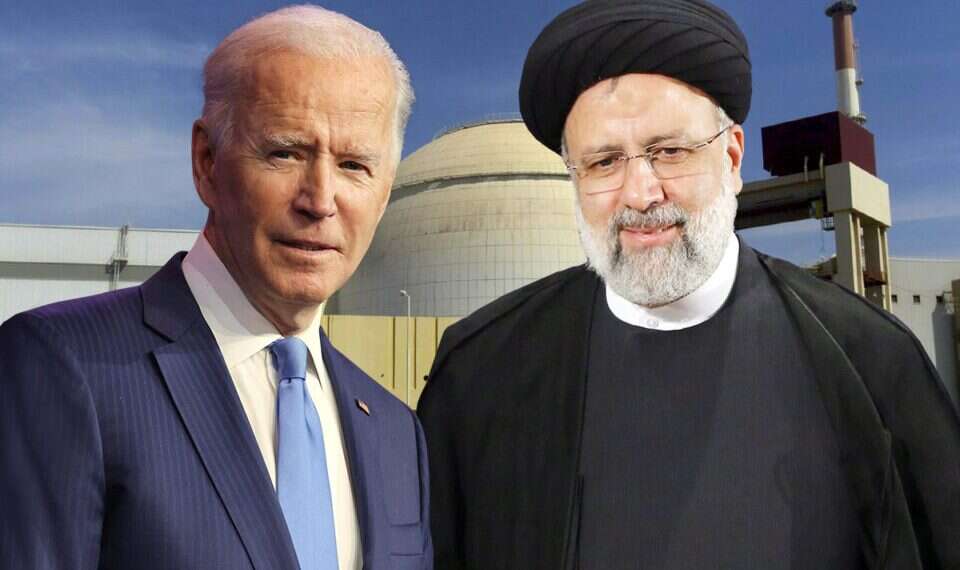by Yoav Limor
Washington is apparently willing to lift economic sanctions on Iran almost entirely and make far-reaching concessions pertaining to the international monitoring mechanism on its nuclear activities. What are Israel's options?
 |
| US President Joe Biden, Iranian President-elect Ebrahim Raisi, amid the backdrop of the Bushehr nuclear power plant in Iran | Reproduction: AFP, AP |
IDF Chief of Staff Lt. Gen. Aviv Kochavi debated to the last moment whether or not to travel to Washington on Saturday. The volatility of the Gaza sector again threatened to upend the trip, similar to last month when security tensions led to Operation Guardian of the Walls.
Ultimately, Kochavi decided to go, which was the right choice. There are more pressing issues than Gaza, chief among them Iran. The United States, it appears, is determined to finalize a nuclear deal with Iran as soon as possible and take it off the national agenda. Information obtained by Israel in recent days points to Washington's willingness to almost entirely remove economic sanctions currently imposed on Iran and make far-reaching concessions pertaining to the international monitoring mechanism on its nuclear activities.
The election of Ebrahim Raisi as Iran's next president means Tehran will likely maintain its hawkish approach to the nuclear talks in Vienna, such that a deal isn't expected to be finalized in the coming days. This gives Israel a narrow window of opportunity to try influencing the Biden administration and subsequently the emerging nuclear deal.
Kochavi will be the first senior Israeli official to tackle the challenge as part of the Israeli government's policy shift. While Benjamin Netanyahu determined the nuclear deal was flawed fundamentally and prohibited senior security and diplomatic officials from discussing its details with the Americans, Prime Minister Naftali Bennett has adopted a different approach whereby a problematic deal is better than a terrible deal. In other words: Given that the US has already decided in favor of renewing the nuclear deal, Israel must make as much lemonade as possible from the lemon it's been given.
On the surface, it appears Kochavi's chances of success (along with the other senior Israelis expected to visit Washington in the coming weeks, including President Reuven Rivlin and new Mossad director David Barnea) are not high. Regardless, the effort is worthwhile. Iran is far closer today to a nuclear weapon than it was when the US withdrew from the original nuclear deal in 2018; in the absence of American motivation for maintaining maximal pressure on Tehran – let alone threatening it militarily – new ways must be found to delay Iran's consistent and disconcerting progress in all parameters of its nuclear research and development.
But the efforts with Washington – which will certainly be presented to the cabinet at its first meeting on Sunday – are just part of the decisions the new government must make pertaining to Iran's nuclear program. Alongside refining the military option (which requires special budgetary and operational approval), Israel needs to establish other avenues of action to ensure the nuclear deal is extended and enforced as assured by the Americans. It must also re-anchor understandings regarding the so-called "war between wars" against Iran, its efforts to establish a presence in Syria and arm Hezbollah in Lebanon.
It's safe to assume the Americans, for their part, will look to challenge the new Israeli government on the Palestinian issue. It's doubtful this multi-headed government will be able to make any progress on this issue (and it likely doesn't want to), but peace and quiet in Judea and Samaria can be bought with money, projects and other long-term plans. Concerning Gaza, Israel requires international legitimacy to stand firm against Hamas when negotiations finally begin in Cairo; and alternatively – be able to retaliate militarily if cross-border arson attacks persist.
These issues will necessitate coordinated, hands-on leadership. The diplomatic-security cabinet rarely convened under Netanyahu, a trend that is likely to change. The government would do well to eschew pointless debates and rather focus on establishing strategy and making decisions. Beyond Iran and the Palestinian arena are challenges on all fronts, including domestically, that require solutions – from the national budget, the IDF's structure and its long-term plans, to shortening mandatory military service, relocating Military Intelligence Directorate headquarters to the Negev, and the acute crisis of motivation to serve in the first place.
Yoav Limor
Source: https://www.israelhayom.com/2021/06/20/new-information-sparks-concern-in-israel-over-us-iran-deal/
No comments:
Post a Comment